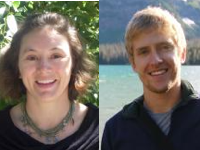One-on-one with ISU researchers abroad

Courtesy of Iowa State University
Dr. Haldre Rogers (L), assistant professor in the ISU Department of Ecology, and Evan Fricke (R), a postdoctoral researcher.
June 16, 2017
Evan Fricke, a postdoctoral researcher, and Dr. Haldre Rogers, assistant professor in the ISU Department of Ecology, Evolution and Organismal Biology, are currently on Saipan, a small island in the Northern Mariana Islands.
They recently published a study examining co-extinction among plants and animals. We had a one-on-one with both to talk about their research.
ISD: What is your research about?
Dr. Rogers: In general, my research tries to understand how important birds are for forest systems, and what they do functionally. Recently, most of my work has been focused on birds who eat fruit and move seeds around and how important that process is for a forest.
ISD: How long have you been researching this?
Dr. Rogers: 2006 is when I first started research out [in the Mariana Islands].
ISD: Why were you interested in researching this?
Fricke: I’ve always been drawn to the idea of species interactions. I think it’s pretty fascinating how nothing in the natural world exists in isolation. Everything’s really connected in these really interesting ways.
ISD: What did you find most surprising in your research?
Fricke: Patterns that I had seen in Guam, and that bird species that only have fruit in their diet pattern that I found. There’s this really nice relationship globally, same pattern, that I found in the small community here. That was pretty surprising that there was this clean pattern that I could see based on these sources of data that people had collected for a totally different reason.
ISD: If you were not studying in Saipan, where is somewhere you would like to travel for research purposes?
Dr. Rogers: [I would research] in East Asia. A lot of their forests are overhunted, but there hasn’t been much research done there.
Fricke: I would love to find reasons to go to some of the other Pacific islands out here and see sort of related birds and plants.
ISD: Where is somewhere you want to travel, or where is your favorite place to travel for leisure?
Dr. Rogers: I’d love to go to Nepal and see the big mountains. It would be relaxation for me because I could kind of check out from email and my computer and hike, so I would do that.
Fricke: I’ve spent some time in southern Chile which there’s some really fascinating ecosystems there. It would be a wonderful place to visit, with big mountains, volcanoes, nice forests and lakes.
















